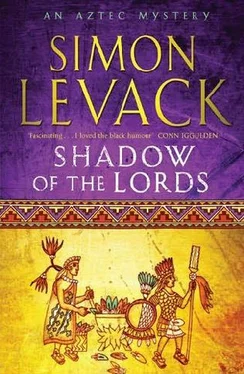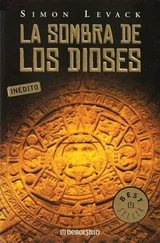Simon Levack - Shadow of the Lords
Здесь есть возможность читать онлайн «Simon Levack - Shadow of the Lords» весь текст электронной книги совершенно бесплатно (целиком полную версию без сокращений). В некоторых случаях можно слушать аудио, скачать через торрент в формате fb2 и присутствует краткое содержание. Год выпуска: 2011, Издательство: St. Martin, Жанр: Исторический детектив, на английском языке. Описание произведения, (предисловие) а так же отзывы посетителей доступны на портале библиотеки ЛибКат.
- Название:Shadow of the Lords
- Автор:
- Издательство:St. Martin
- Жанр:
- Год:2011
- ISBN:нет данных
- Рейтинг книги:4 / 5. Голосов: 1
-
Избранное:Добавить в избранное
- Отзывы:
-
Ваша оценка:
- 80
- 1
- 2
- 3
- 4
- 5
Shadow of the Lords: краткое содержание, описание и аннотация
Предлагаем к чтению аннотацию, описание, краткое содержание или предисловие (зависит от того, что написал сам автор книги «Shadow of the Lords»). Если вы не нашли необходимую информацию о книге — напишите в комментариях, мы постараемся отыскать её.
Shadow of the Lords — читать онлайн бесплатно полную книгу (весь текст) целиком
Ниже представлен текст книги, разбитый по страницам. Система сохранения места последней прочитанной страницы, позволяет с удобством читать онлайн бесплатно книгу «Shadow of the Lords», без необходимости каждый раз заново искать на чём Вы остановились. Поставьте закладку, и сможете в любой момент перейти на страницу, на которой закончили чтение.
Интервал:
Закладка:
With one last brief glance at the screen, I went on my way.
THREE RABBIT
1
Ihad no difficulty in memorizing the directions Kindly had given me. Still I managed to get lost four times. The horrifying discovery I had just made kept forcing itself into my thoughts, making it hard to concentrate. It was not until late in the morning that I found myself where I wanted to be, and even then I was not certain I had got it right.
The route Kindly had given me took me among the sturdy, respectable houses of the featherworkers, and past them. It led me down narrow, overgrown, silted-up canals whose stagnant waters reeked even on a cool winter’s morning, among wretched hovels, some of them little more than one-room huts, some of them obviously long abandoned and others with their roofs coated with moss and their sides piled high with stinking garbage, and into what I was convinced must be another parish altogether.
Eventually I asked a water seller to confirm that I was where I thought I was. He was standing up in a canoe, using his paddle to hack his way through the reeds in his path while lumps of green scum swirled and coagulated in his wake. The canoe was laden with pots that I presumed were full of fresh water from the spring at Chapultepec, on the mainland. Every morning the water sellers drew it from the aqueduct that had been built over the lake in Emperor Ahuitzotl’s time, and filled their pots with it for sale to countless thirsty households in thecity Of course, Mexico was riddled with canals, but nobody in his right mind would ever drink out of them.
My question made him laugh. ‘Amantlan? You must be joking!’ His voice had a nasal tone, the result of trying to avoid breathing through his nose. ‘Amantlan’s back there.’ He jerked his head to indicate the way I had come. ‘This is Atecocolecan.’
I stared about me, bewildered. I had not realized I had walked so far, but as I took in my surroundings it began to make sense. Atecocolecan: the Place of the Angry Water. I had walked all the way to the edge of Mexico’s island, close to where the northern causeway linked the city to Tepeyac on the mainland. ‘It’s a dump! Look — there isn’t even a path over there. It’s just a marsh — you can’t tell where the canal ends and the ground starts. These houses must be waterlogged all the time.’ The name of this place was no accident. After a serious flood many of the hovels around me would be driftwood.
He dipped his paddle in the water. ‘Afraid so,’ he acknowledged.
‘Do you know where Skinny lives?’ I called after him, as his canoe at last got under way through the gap he had hacked through the foliage. ‘Only I was looking for him, but I got lost.’
‘Skinny?’ He laughed shortly without looking around. ‘You’re not lost. He lives right here!’ He waved his paddle at a house just a few paces away. ‘Doesn’t owe you any money, does he?’
‘No.’
‘Good for you! If you catch him, mention me, eh? Tell him I’ll settle for a nice plump turkey hen, as long as she’s a good layer. Otherwise he can drink his own piss!’
The paddle hit the water with an emphatic splash, throwingup a jet of green and brown muck. It did not propel the canoe forward with any great speed, but it probably felt good.
Skinny’s house was not one of the meanest in this part of the city. It was in better condition than the dwellings on either side. On the other hand, they were both ruins, evidently deserted, unless you counted the rats. The featherworker’s property looked sturdy enough, but its walls were in desperate need of rendering and all that remained of the garden on its roof was a few bedraggled brown leaves trailing over its edge.
A gang of men driving wooden piles into the bed of the swamp at the back of the house, shaking the ground with their hammering and tormenting the air with their tuneless singing, did nothing for the neighbourhood. The water seller’s s parting remark came back to me. Here was the home of a family down on its luck.
I wondered how a featherworker could possibly have ended up here, especially one as eminent as Skinny Amantlan was like many parishes in Mexico, in that its people were a close-knit community, bound together by ties of kinship, whose sons and daughters rarely married outside and were expected to carry on a family business that they had in common with all their friends and relations. Put two Aztecs together and there would be rivalry, and the Amanteca were no exception to this, but something extraordinary must have happened to allow a great craftsman to fall so far, without his peers doing anything to stop it.
Considering the state of his home, I began to wonder whether it would, after all, be so surprising if Skinny had sold the god’s costume to Kindly. He might well have been desperate enough.
A low square doorway, leading straight into a room, broke the clean white expanse of the wall in front of me. There wasno screen but the interior was too dark to give anything away. The glare of a sunlit courtyard, visible through another doorway directly opposite the street entrance, made it look darker. By squinting I was just able to make out a few features in the courtyard: the domed shape of a sweat bath against the rear wall, another doorway off to one side.
There was no one in the first room and I went straight through into the courtyard. That was deserted too. This puzzled me, because most dwellings in Mexico were home to more than one household and were consequently crowded, even during the day with the men away in the fields.
I stopped wondering about that when I saw the idols.
Every house in Mexico had them. In most a ledge near the hearth served as a shrine, a home for the household’s patron deities, who might be feared or adored but were always cherished and often treated as if they were members of the family.
Here, it seemed, things were done differently. Two of the courtyard’s four walls, the ones that were not lined with rooms, were richly decorated with statuettes of the gods. Some were new, some old. The biggest was half my height and I could have closed my fist around the smallest. They were made of everything from brilliantly polished greenstone to crudely carved wood, ash or fir or something similarly cheap and plentiful. I saw Tezcatlipoca, Xipe Totec with his mask of human skin, Tlaloc with his protruding, goggle eyes and his consort Chalcihuitlicue, She of the Jade Skirt, Ohmacatl, the vain and importunate lord of the feast, several other gods I knew and a few I did not know. I supposed the particular gods of the featherworkers — Coyotl Inahual and the women Xilo and Xiuhtlati — must be here, and I recognized Yacatecuhtli, the merchants’ god, whom the featherworkers honoured as well.
There was something odd about these figures, apart from their number and variety. All of them, despite having beenplaced so carefully in niches that had been lovingly prepared for them, were coated in a fine layer of dust, and some were stained, smeared, defaced with dried muck. One of the idols had even been broken. It was impossible to tell which god it represented, because all that was left was a jagged greenstone stump.
Clay flower pots stood on the floor of the courtyard. One of them had fallen over and cracked, leaving the floor around it strewn with soil. That made me frown, for sweeping was a sacred duty and for a pious Aztec to neglect it altogether was all but unthinkable.
When I looked up again I saw I was no longer alone.
Although the wall to my right stretched the whole length of the courtyard, there was only one opening in it, the one I had caught sight of from the front of the house. A short, grubby cloth screen had been hung across it. This still shivered, as it would if it had been tugged aside and jerked back into place. A man stood in front of it.
Читать дальшеИнтервал:
Закладка:
Похожие книги на «Shadow of the Lords»
Представляем Вашему вниманию похожие книги на «Shadow of the Lords» списком для выбора. Мы отобрали схожую по названию и смыслу литературу в надежде предоставить читателям больше вариантов отыскать новые, интересные, ещё непрочитанные произведения.
Обсуждение, отзывы о книге «Shadow of the Lords» и просто собственные мнения читателей. Оставьте ваши комментарии, напишите, что Вы думаете о произведении, его смысле или главных героях. Укажите что конкретно понравилось, а что нет, и почему Вы так считаете.











